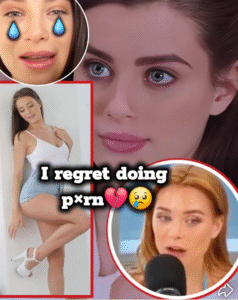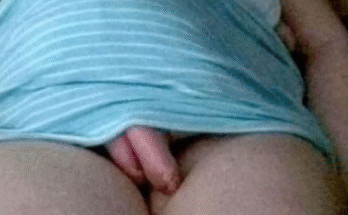Lana Rhoades’ Emotional Plea Sparks Fierce Debate: The Internet Divided Over a Star’s Cry for Redemption
Former adult film star Lana Rhoades has once again become the center of a heated cultural debate—this time not for her past work, but for an emotional plea that has shaken social media. Her heartfelt request for her videos to be permanently deleted from the internet has ignited conversations about consent, exploitation, redemption, and the permanence of digital footprints. What began as a personal statement has quickly evolved into a larger discussion about the power—and the pain—of living with one’s past in the online age.
The Plea That Started It All
In a recent interview clip that went viral across X (formerly Twitter), TikTok, and Instagram, Rhoades spoke candidly about her regret over her past and the toll it has taken on her mental health and personal life. She tearfully admitted that she wishes she could erase all traces of her adult content from the internet, saying she was “too young to understand what [she] was really getting into.”
“I was 19, broke, and desperate,” she explained. “I thought I was making a decision that would give me control of my life, but it ended up taking that control away. I want every single video removed so my son never has to see that version of me.”
Those few sentences resonated with millions. Supporters saw her as a woman bravely confronting trauma and exploitation, while critics accused her of hypocrisy for disowning the very industry that made her famous. The resulting conversation has been raw, emotional, and polarizing.
Supporters: “She’s a Survivor, Not a Villain”
For many, Lana Rhoades’ words struck a deep chord. Her supporters argue that her story shines a light on the darker realities of the adult entertainment world—an industry often glamorized yet riddled with manipulation, coercion, and psychological harm.
Advocates for women’s rights and mental health highlighted that Rhoades’ experience reflects a broader systemic problem: young women being drawn into adult entertainment under economic pressure or emotional vulnerability, only to face lifelong consequences.
“People underestimate the emotional trauma that comes with this kind of work,” one fan commented online. “She was barely out of her teens. She deserves compassion, not condemnation.”
Others noted that Rhoades’ willingness to speak out could empower others in similar situations to seek help. They view her plea as a rare act of honesty in a world that often rewards silence and denial.
In addition, some mental health advocates praised her for addressing the psychological aftermath of online exposure. Once something is uploaded to the internet—especially in the adult industry—it can follow a person forever. For Rhoades, who now has a child, that permanence is both terrifying and tragic.
Critics: “You Can’t Erase What You Built”
Yet, not everyone is sympathetic. Critics argue that Rhoades is attempting to rewrite history—profiting from fame that originated in adult entertainment while disavowing it once it became inconvenient.
“She made millions off that career,” one detractor wrote. “Now she wants to erase the very thing that gave her a platform? That’s not bravery; that’s revisionism.”
Many pointed out the practical impossibility of deleting hundreds of videos that have been distributed, downloaded, and mirrored across thousands of websites worldwide. The adult internet economy thrives on duplication, meaning complete removal is nearly impossible. Even if major platforms agreed to take them down, countless pirated copies would remain.
Others accused her of weaponizing regret as a form of rebranding—trying to distance herself from her past now that she’s transitioned to influencer and entrepreneur status. They claim that while she publicly disowns her adult career, she still benefits from the fame and visibility it gave her.
“Accountability goes both ways,” one online commentator argued. “If you make choices as an adult—even bad ones—you have to live with them. You can’t just undo it because you changed your mind.”
A Larger Question: Can You Truly Escape Your Digital Past?
Beyond the personal debate around Lana Rhoades herself lies a much larger societal question: Can anyone truly escape their online past?
In the digital era, everything we post—photos, videos, tweets—can become permanent. For those in adult entertainment, that permanence is amplified exponentially. Once content circulates on the internet, it becomes nearly impossible to control, even with copyright laws or takedown requests.
Rhoades’ plea highlights how the internet’s permanence clashes with human growth and change. People evolve, but the internet doesn’t forget. For someone who entered the industry as a teenager and later became a mother, the inability to detach from that version of herself is devastating.
Her story mirrors that of others who have left the adult industry and struggled to rebuild their lives, only to find their past constantly resurfacing. The stigma, the loss of privacy, and the judgment can make normal life—dating, parenting, even finding work—an uphill battle.
The Industry’s Response
While Lana Rhoades has sparked widespread public debate, the adult industry itself has remained largely silent. Some producers and performers, however, have subtly weighed in. A few current actresses have defended her, acknowledging that burnout, regret, and emotional scars are common but rarely discussed.
Others within the industry have argued that Rhoades’ statements could harm performers who do feel empowered by their work, by reinforcing the stereotype that all adult film workers are victims. “Her experience is valid,” one performer wrote, “but it’s not universal. Some of us chose this life and are proud of it.”
Still, Rhoades’ comments have prompted conversations about whether platforms should create mechanisms for performers to later revoke consent or request content removal—a concept some call “the right to digital erasure.” Currently, such a right doesn’t meaningfully exist in the adult industry.
Between Shame and Empowerment
The emotional divide surrounding Lana Rhoades underscores a timeless human conflict: shame versus empowerment. Can someone reclaim agency after a decision that once defined them? Can regret coexist with empowerment?
For Rhoades, the answer seems to be yes—but it comes with painful contradictions. She has publicly said she doesn’t want to be defined by her past, yet she understands that millions still associate her with it. Her efforts to build a new identity—as a mother, influencer, and entrepreneur—are complicated by the enduring visibility of her previous career.
Her vulnerability in expressing shame about her past may, paradoxically, empower others who feel trapped by their own histories—whether or not they share her background.
The Human Side Behind the Headlines
At its core, Lana Rhoades’ plea isn’t just about the adult industry or online content. It’s about what it means to grow, regret, and seek forgiveness in a world that never forgets. Whether one views her as a victim, a hypocrite, or a survivor, it’s clear that her story has forced millions to confront uncomfortable truths about how society treats women who deviate from its norms.
It has also reignited the question of who owns your image once it’s out there—you, the platform, or the audience?
In a world where viral fame and permanent visibility can feel like both a blessing and a curse, Rhoades’ pain is a reminder of the human cost of digital permanence. She’s not the first to ask for her past to disappear—and she won’t be the last—but her voice has amplified a conversation that has been whispered for years among those who wish they could start over.
Conclusion: A Mirror to Modern Culture
Lana Rhoades’ emotional plea has become more than just a viral story—it’s a mirror reflecting how society judges women, consent, and transformation. Supporters see bravery; critics see contradiction. But both sides reveal the same truth: the internet doesn’t forgive easily, and the line between empowerment and exploitation is often blurred.
In the end, Rhoades’ words echo a universal longing: the right to outgrow your past. Whether the world grants her that grace remains uncertain, but one thing is clear—her story has reignited a fierce debate about ownership, morality, and the price of living online.
And as long as her videos remain online, Lana Rhoades’ struggle to reclaim her identity will continue to represent something bigger than herself—a generation’s desperate fight to be seen as more than the sum of their mistakes.


